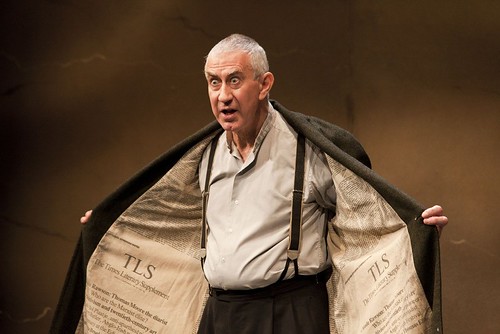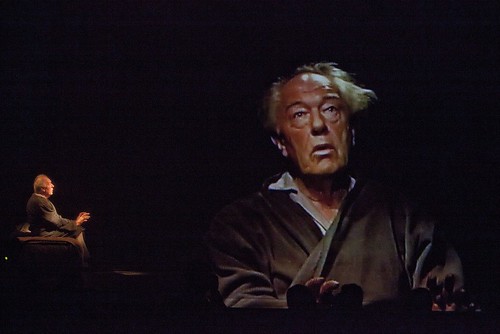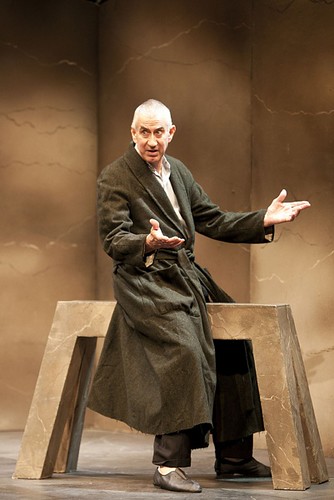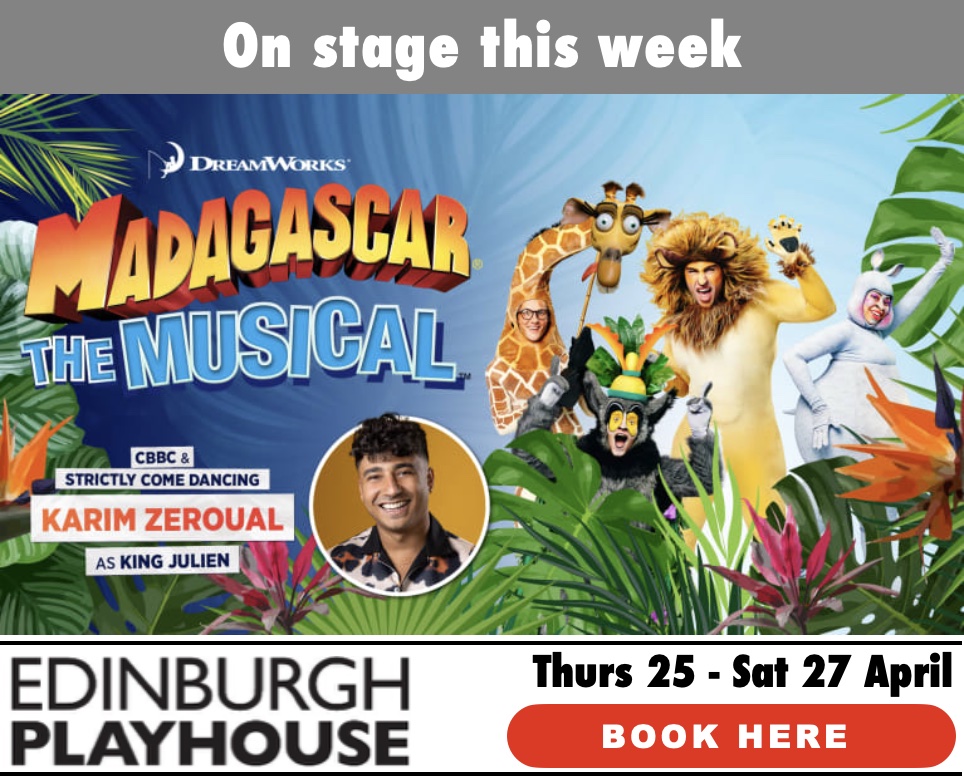Review – Beckett adaptations at the EIF
Eh Joe ✭✭✭✭✩
I’ll Go On ✭✭✭✭✭
First Love ✭✭✭✩✩
Royal Lyceum Theatre
Friday 23 – Sat 31 August 2013
Review by Thom Dibdin
The International Festival has burst into life on the theatre front as the fringe leaves town, with a week of stage adaptations of works written by Samuel Beckett for a medium other than the stage.
Three of these are one man plays from the Gate Theatre, Dublin, performed at the Lyceum. Eh Joe, Beckett’s first TV play, stars Michael Gambon; I’ll Go On is an adaptation of three novels: Molloy, Malone Dies and The Unnameable, staring Barry McGovern; and Peter Egan stars in the adaptation of the 1946 novella First Love.
At just under the half hour, Eh Joe would appear to be the most sprightly of the productions. Yet it is the most mannered, most pointed and stillest of the three.
Gambon plays an old man lost in a reverie. It’s his long hands which attract you first. Unnaturally long and the only source of white in the darkness of a tatty old room, made all the more gloomy as it is seen through a stage-wide scrim.
After searching behind every door and window, closing the curtains on each, he retires to his bed. Only to be disturbed in the darkness and rise to listen to the taunting voice of a dead lover who, she hopes, will be welcoming him soon.
In all this, Joe says not a word. The original television play just focuses on his face, twitching in reaction to the voice, as the camera zooms in on him. In Atom Egoyan’s stage production Gambon sits on the bed, sideways on to the audience on one side of the stage. Filmed by an unseen camera which projects his front-on image up onto the scrim, on the other side.
The voice, a recording of Penelope Wilton, is accusatory and sharp. With scathing authority she draws the life of an uncaring man, smothering those who love him yet craving that love. She relates her triumph in running from him for one better and, triumphal in tone, she succeeds in telling of a younger mistress’s suicide, squeezing out the knowledge before her own voice is silenced.
It is a half hour which passes in held breath. Snot slips down Gambon’s face, smiles sit there briefly – a hopeful reaction to an upbeat tone in the voice, only to be dashed. The camera zooms in, remorseless, eyes flicker away with another hope, and close in attempted respite. Lips tremble.
The slight disappointment is that Wilton’s voice is recorded. It is hard to imagine how the actual presence of the accuser could be incorporated into the stillness of the action, but it would surely add to the experience by bringing a dynamic to the internalised fight between Joe an the voice in his head.
There’s a real vaudeville opening to Barry McGovern’s brilliant, note-perfect performance in I’ll Go On. He steps out in front of the curtain, wrong-footing the audience and setting up what is to come as the ultra-dark comedy it undoubtedly is, despite its sombre subject matter.
A mouth-watering afternoon sandwich between Ivor Cutler and Rory Bremner
It is 27 years since McGovern first performed the piece in Edinburgh – at the Assembly Rooms at the fringe of 1986, according to Gate artistic director Michael Colgan quoted in the programme. And if it sat well in a mouth-watering afternoon sandwich between Ivor Cutler and Rory Bremner, it is a delicious and satisfying offering in the sumptuous Lyceum.
There might be little to like about the artfully constructed anti-hero Molloy, who morphs into Malone and then an unnamed, accuser. But there is everything to like about McGovern’s creation of him.
It is a mesmerising performance which gets right inside the language and meter of the script, to throw the crippled Molloy into a darkly lit corner on the stage. From inside an all-encompassing greatcoat, McGovern conjures up a twisted constantly thwarted individual.
Perhaps it is the bicycle references which bring to mind Flann O’Brien’s brilliant novel The Third Policeman, but Beckett trumps even these for comic observation. But it is not just comedy – a long passage about sucking stones, which Molloy keeps in his pockets and attempts to suck evenly, highlights as much about the futility of his life and its many levels of poverty, as it provides in hilarity.
The pace and understanding of a complex structure are sustained through the two shorter portions of the production. In particular, the final monologue of The Unnameable, with its descent into the gratuitous, is a masterclass in how to deliver a tumbling passion of words with understanding and nuance.
The third piece of the three has Peter Egan tackle First Love, Beckett’s novella of 1947. A brilliantly austere production of this was brought to the Traverse earlier this year by the Gare St Lazare Players, performed by Conor Lovett and reviewed on All Edinburgh Theatre here.
Egan, under the direction of Toby Frow, takes an altogether less mannered approach to the story of a young man who is jettisoned from his home when his father dies and who then meets a woman on a bench by the canal. Despite his best intentions the man surmises he is in love when he finds himself mournfully fingering her name into a crusted-over cow-pat in the byre where his inertia has led him.
It is a strangely uncompelling performance, one which fails to trust the vile beauty of Beckett’s text, preferring instead to dress it up in unnecessary gesture and vocal inflexion. Egan forces plenty of laughs, to be sure, and it is a perfectly reasonable performance.
But in refusing to make the images created by the language the focus of the piece, but rather the rambling narrator – and one whose loss of words does not always seem to be completely intended – the real power of the whole piece is lost. A disappointing end to an enthralling three pieces.
Details of the Beckett season on the EIF website: www.eif.co.uk
Details of Eh Joe: www.eif.co.uk/ehjoe
Details of I’ll Go On: www.eif.co.uk/igoon
Details of First Love: www.eif.co.uk/firstlove
Purchase the original novels on Amazon:
ENDS




























